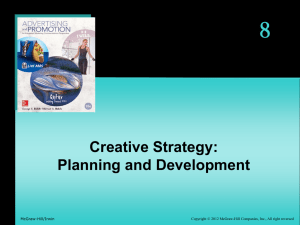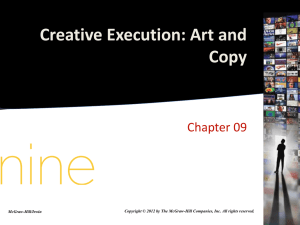Chapter 6
advertisement
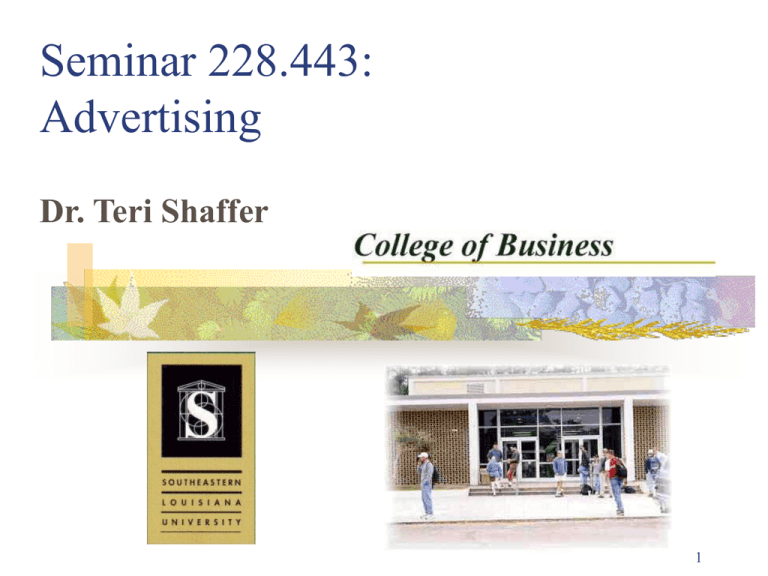
Seminar 228.443: Advertising Dr. Teri Shaffer 1 IMC Campaign Outline Introduction Situation analysis SWOT analysis Key strategy decisions The creative plan 2 The Creative Plan Creative process & person Creative strategy Writing print ads Writing radio ads Writing tv ads Writing interactive ads 3 Creativity “…art of establishing new and meaningful relationships between previously unrelated things in a manner that is relevant, believable, and in good taste but which somehow presents the product in a new light.” Leo Burnett 4 Exhibit 13-1 (Page 409) Creativity Is the Search for New and Different Viewpoints. 5 The Creative Process Preparation---immersion and gathering raw material Mental digestion---constantly thinking Incubation---daydreaming Illumination---idea appears out of nowhere Application---puts idea into action 6 Brainstorming Group of people to generate many ideas by playing off of each other’s ideas. 7 Rules of Brainstorming Anything goes No criticism The more the better Quantity of ideas is directly related to quality of ideas 8 The Creative Personality We are all born with some degree of “creativity” Creative people tend to be: Independent Self assertive Persistent Self disciplined Tolerant of ambiguity 9 Creative Strategy What advertising is going to say How it will be said Best advertisements are: Simple Clear Definite focus 10 Components of Creative Strategy Advertising objectives Target audience profile Buying habits, lifestyles, & motivations Personal profile (Exhibit 13-8 on page 422) Key consumer benefit (USP) 11 Unique Selling Proposition (USP) M & M’s--”Melts in Your Mouth, Not in Your Hands” Maytag---Friendly Repairman 12 Components of Creative Strategy Advertising objectives Target audience profile Key consumer benefit (USP) Strategic approach Product positioning, appeals used, & how USP will be presented 13 Positioning Statement “Hallmark is the most convenient greeting card because it offers the best selection, most thoughtful verse, and emotional content that matches the sender’s thoughts with the receiver’s needs. This results in a successful care purchase without spending a lot of time looking. There is a sense of reliability, comfort, and confidence in knowing that Hallmark will have the right card. The consumer’s choice can revolve around which card is best, rather than which card comes closest in either location or quality.” 14 Components of Creative Strategy Advertising objectives Target audience profile Key consumer benefit (USP) Strategic approach Product positioning, appeals used, & how will USP be presented If no USP, other basic strategic approaches Exhibit 13.9 on page 423 15 Components of Creative Strategy Advertising objectives Target audience profile Key consumer benefit (U SP) Strategic approach Support Provide writers with supporting details Tone, style, and manner Brand personality to be conveyed 16 Putting Strategy Into Writing Creative platform Plan for more than one ad Copy platform Plan for each ad 17 Advertising Campaign ...a series of related advertisements that have a common theme, common slogan, and have a common set of advertising appeals 18 Theme General feeling or emotions 19 Slogan “Battle cry” of the advertiser ...a short written or verbal message “Come see the softer side of Sears.” 20 Theme and Slogan Examples Pillsbury Doughboy Nothing spells loving like something cooking in the oven. 21 Theme and Slogan Examples Taco Bell Dog “Yo Quire Taco Bell” 22 Advertising Appeals Something that makes the product particularly attractive or interesting to the consumer. i.e. security, esteem 23 Example: Advertising Appeals Bayer Aspirin Relieves headaches Caffeine free Sodium free Pain relief Recognized brand name Reduces heart attacks Reduces inflammation from arthritis 24 Words and Advertising Copy Copywriter 25 From the Internet Copywriting Tips (an extensive guide to writing copy and creating ads) Nomm de Plume http://nomm.com/copywriting.htm 26 Writing for Print Advertising Illustrations or visuals Body copy Slogans & taglines Logotypes or signature cuts Elements Headlines Overlines & underlines Subheadings Captions 27 Headlines Most important verbal element According to David Oglivy, it is 5x more important than body copy Goal of headline: GAIN ATTENTION 28 David Oglivy’s Techniques Promise a benefit “I hate situps. I hate situps. I hate situps. I hate situps. I hate situps.” Rollarblade 29 David Oglivy’s Techniques Inject news “Announcing the most significant fleet to enter the Caribbean since the Nina, Pinta, and Santa Maria.” American Airlines 30 David Oglivy’s Techniques Provide useful information “I know I should quit. Don’t tell me why, tell me how.” Nicoderm 31 David Oglivy’s Techniques Include Brand Name “The good news is Jeep Grand Cherokee is now available with a V8. There is no bad news.” 32 David Oglivy’s Techniques Select your target audience “Exactly how mad is she?” American Floral Marketing Council 33 David Oglivy’s Techniques Be specific “Fifteen dealerships into their search, Barry and Cynthia Nelson felt like throwing in the towel.” Saturn 34 Most Common Types of Headlines Benefit---promises a reward News---promises that if read, get information Curiosity---intriguing question or creative play on words 35 Benefit Headline 36 News Headline 37 Curiosity Headline 38 Subheadings Organizational headings Overline Underline Above headline After headline Smaller than headline but larger than copy 39 Subheadings: Overline 40 Subheading: Underline 41 Captions Under or next to photographs or illustrations Help reader interpret them 42 Caption Doubles as Headline 43 Body Copy Heart & substance Type is smaller than headline/subheadings Follow through on headline and illustration theme “You approach”---writing to one person 44 Structure of Body Copy Lead paragraph Interior body copy Continues with main idea, transition to more specific selling points Most of selling takes place Closing paragraph Move reader to action 45 Tagline Slogan Brita example: “Tap into great taste.” 46 47 Types of Body Copy Straightforward Narrative Uses a story to get point across Dialogue Better suited for radio and television Dialogue between people Testimonial---person speaks to audience 48 White Space Large areas Openness, exclusivity, and simplicity Busyness Excitement, curiosity 49 Hallmark 50 K2 Skates 51 Balance Distribution of elements around imaginary vertical line Formal balance---symmetrical Informal balance---asymmetrical 52 Formal Balance 53 Informal Balance 54 Proportion Relationship in size between elements 55 Parker Pen 56 Color Reds = excitement Earth tones = warmth Greens = nature Blacks = richness and sophistication 57 Intensity Brightness Excitement Subdued Peacefulness 58 Contrast Lightness or darkness Neiman Marcus 59 General Steps in a Layout Thumbnail Sketches Preliminary Sketches Rough Layouts Ads Done to Size Without Attention to Looks Semicomps Layout Drawn to Size, Used for Presentations Comprehensives Art is Finished, Designed to Impress Audience Mechanical Largely Computer Based and Generated to Guide Color Separations 60 61 62 63 64 Writing for Outdoor 7 words or less for headline Great source for examples Outdoor Advertising Association of America, Inc. http://www.oaaa.org/zzroutside/OBIEAwar ds/OBIE2000Results.htm 65 Outdoor Advertising 66 Writing for Radio “Theater-of-the-mind” Dramatic use of voices, music, and sound effects Write the way people speak Short sentences, fragments, and phrases 2 words per second 67 Radio Formats Pitch format Slice-of-life or situation format Straight announcement Pitch for product at end Song format Jingle Donut (song then announcement) 68 Radio Scripts Single column Voices identified Sound effects noted 69 Writing for Television Pictures tell the story Should be able to tell story without audio Example: Polaroid Key visual symbol One frame sums up entire commercial 70 Most Common Types of TV Ads Demonstration Glad-Lock bags 71 Most Common Types of TV Ads Testimonials Ordinary person Expert endorsers Celebrity endorsers 72 Most Common Types of TV Ads Presenters “The talking head” 73 Most Common Types of TV Ads Slice-of-Life Story 74 Most Common Types of TV Ads Lifestyle/Emotion Focus on interests and activities 75 Most Common Types of TV Ads Animation Claymation 76 Humor Effective, but… Difficult to write Can overwhelm the product Wears out so need a large pool of ads Vampire creativity People remember ad but not product/source 77 Music Can set mood Jingles can serve as memory devices 78 Writing for Television Storyboards Roughly sketched 79 Storyboard 80 Writing for Television Storyboards Roughly sketched Photoboard Still photographs Exhibit 15-9 Stealamatic Steal footage from other commercials 81 Writing for Interactive Media Web sites Banner ads 82 Guidelines Sensitive to time it takes to retrieve information Response and feedback mechanisms Dynamic Worldwide so prepare for response IMC 83 Criteria for a Good Ad “BDMS” Believable Distinctive Memorable Simple 84

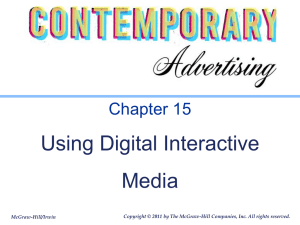
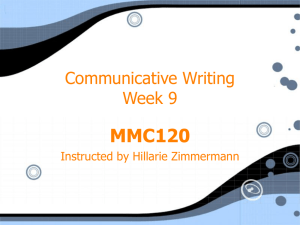
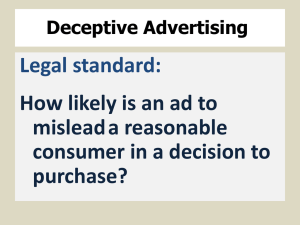
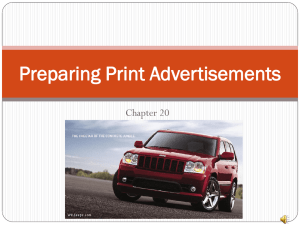
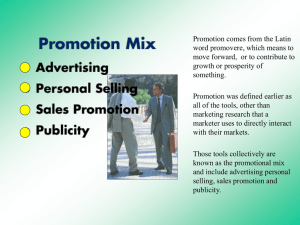
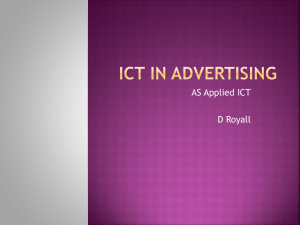
![SEM1_3.04[1]](http://s2.studylib.net/store/data/005388458_1-52db6904e80064cb79ccc6a3c2da41c0-300x300.png)


